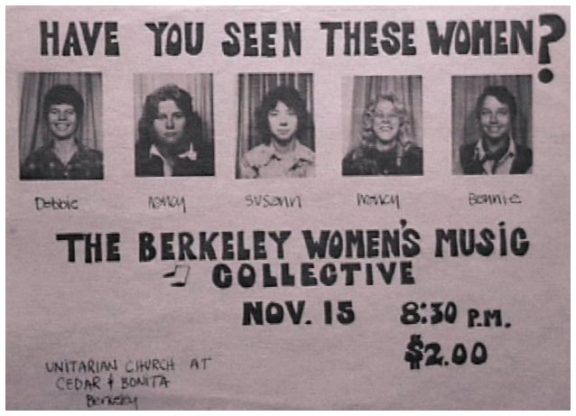This handmade flyer for a Berkeley Women’s Music Collective show, whose title riffs on the handbills posted for fugitives from the law, points to the rebellious energy that helped bring the band together, and that they hoped to instill in their audience.
Part of the band’s mission was to show women, in the spirit of the larger women’s liberation movement, that there were alternative lifestyles and livelihoods available to them. After World War II, many women who had joined the workforce and achieved financial independence during the war were driven back into traditional roles as housewives and homemakers. For these women and the daughters they raised, the women’s music community offered an escape from traditional gender roles and a glimpse of a new reality, one in which they were independent and free.
***
In a recent interview, Debbie Lempke discusses growing up in the fifties and the subversion of women’s roles that occurred in post-war America.
Debbie: Many of our mothers were very distraught, like for instance, my mother who adopted me had a graduate degree in public health, and when my father got back from the war and they got married, he was like, “you’re not working.” And I felt like there was always in the house, this kind of underlying anger about the situation. Repressed anger that she didn’t get to do what she wanted to do.
And I know other people felt that, but I felt like she was to a certain extent vicariously happy that I was (getting to do what I wanted to), even though she couldn’t quite get behind it. She wasn’t a fighter. She didn’t like to rock the boat. But I think she liked that I was (rocking the boat), even though it made her a little uncomfortable.
The next generation carries that (repressed anger), cause all our mothers had opportunities during the war because there was a shortage of men to take these positions. And then when they came back, they were all told to just go back in the house and there was there was a repressed feeling, I think, in a lot of people’s households.
***
From a similar recent interview Nancy Vogl speaks about the importance of the women’s music community for women oppressed by traditional gender roles.
Nancy: It saved lives is what I’ll tell you. Women in Little Rock, Arkansas, or in Montana or Oklahoma who were just dying out there and ready to choose suicide, knew that at our concerts they could be with their tribe, where they belonged. It saved women’s lives; there’s no doubt about it at all. You said, why did we play music? We knew that women were offing themselves or drinking too much or doing drugs because they couldn’t come out and be their authentic selves; they couldn’t be fully human and express their full humanity.
So a part of our work was to go from town to town to let other women know that it was possible. I’m not trying to be self-aggrandizing that we were any big shakes, I’m just saying by our mere existence we provided an alternative to self-medication and self-harm and there were thousands of women who were stuck in that dynamic.
